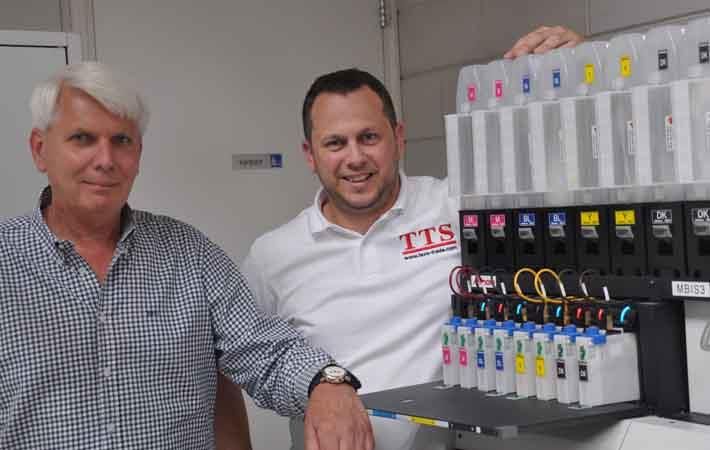Interviews
News Flash
Phoenext installs Mimaki JV 150-160 inkjet digital printer
24 Aug '17
3 min read

Phoenext, manufacturers of functional textiles like football flags, scarfs, pillows, oven gloves, and sleep masks based in Netherlands, has announced that the company has installed the new high-speed JV150-160 printer by Mimaki. Mimaki is a developer of wide-format inkjet printers and cutting machines for the sign/graphics, apparel, and industrial markets.
The Mimaki JV 150-series is considered an affordable model, ideally suited as an entry model for both small and large textile applications. The Mimaki JV150 is a multi-purpose printer that comes in two setups: direct print (sign and graphics) or a transfer sublimation printer (via sublimation paper on textile).
For textile prints, Phoenext relies solely on transfer sublimation print. An inverted left-to-right image is printed on sublimation paper. This paper is then transferred to paper in a calendar by means of heat and pressure. This technique delivers the best quality at the highest resolution for textile printing.
Michel Prins at Mimaki textilel specialist Texo Trade Services (TTS) in Waddinxveen said, “The pillow that is direct printed textile, shows a blurry cross-over between the copy and the logo. The transfer sublimation printed pillow on the other hand shows a pixel-perfect print with the sharpest of details.”
TTS supplies the Phoenext with the ink, the sublimation paper, and the textiles. The increasing demand forced a capacity problem onto the company; they knew it was time to install a second printer: the Mimaki JV150-160.
After installing the new printer, TTS also optimised their current set-up and transferred from the Mimaki SB52- to the Mimaki SB53-inks. These Mimaki SB53 transfer sublimation inks have a high viscosity and only produce a minimal amount of volatile organic compounds. The Mimaki SB53-inks also carry the OEKO-TEX approbation mark, this guarantees that the applied chemicals in the sublimation inks are not hazardous to the environment, making the ink perfectly suited for durable textile applications.
Prins said, “During the installation of the new Mimaki JV150-printer, we matched the colours to those of the Mimaki TS34. That was our starting point for the colour management. Next, we also adjusted the settings of the Mimaki TS34 to those of the Mimaki SB53-inks.” The transfer sublimation printers at Phoenext are operating as they should, handling both smaller productions and larger orders. This is partly due to the Mimaki Bulk Ink System (MBIS) that both printers run on. It makes sure the printer does not have to refill inks as often, which enables longer, uninterrupted production runs. (GK)
The Mimaki JV 150-series is considered an affordable model, ideally suited as an entry model for both small and large textile applications. The Mimaki JV150 is a multi-purpose printer that comes in two setups: direct print (sign and graphics) or a transfer sublimation printer (via sublimation paper on textile).
For textile prints, Phoenext relies solely on transfer sublimation print. An inverted left-to-right image is printed on sublimation paper. This paper is then transferred to paper in a calendar by means of heat and pressure. This technique delivers the best quality at the highest resolution for textile printing.
Michel Prins at Mimaki textilel specialist Texo Trade Services (TTS) in Waddinxveen said, “The pillow that is direct printed textile, shows a blurry cross-over between the copy and the logo. The transfer sublimation printed pillow on the other hand shows a pixel-perfect print with the sharpest of details.”
TTS supplies the Phoenext with the ink, the sublimation paper, and the textiles. The increasing demand forced a capacity problem onto the company; they knew it was time to install a second printer: the Mimaki JV150-160.
After installing the new printer, TTS also optimised their current set-up and transferred from the Mimaki SB52- to the Mimaki SB53-inks. These Mimaki SB53 transfer sublimation inks have a high viscosity and only produce a minimal amount of volatile organic compounds. The Mimaki SB53-inks also carry the OEKO-TEX approbation mark, this guarantees that the applied chemicals in the sublimation inks are not hazardous to the environment, making the ink perfectly suited for durable textile applications.
Prins said, “During the installation of the new Mimaki JV150-printer, we matched the colours to those of the Mimaki TS34. That was our starting point for the colour management. Next, we also adjusted the settings of the Mimaki TS34 to those of the Mimaki SB53-inks.” The transfer sublimation printers at Phoenext are operating as they should, handling both smaller productions and larger orders. This is partly due to the Mimaki Bulk Ink System (MBIS) that both printers run on. It makes sure the printer does not have to refill inks as often, which enables longer, uninterrupted production runs. (GK)
Fibre2Fashion News Desk – India
Popular News
































-Ltd..jpg?tr=w-120,h-60,c-at_max,cm-pad_resize,bg-ffffff)





.jpg?tr=w-120,h-60,c-at_max,cm-pad_resize,bg-ffffff)
.jpg?tr=w-120,h-60,c-at_max,cm-pad_resize,bg-ffffff)






